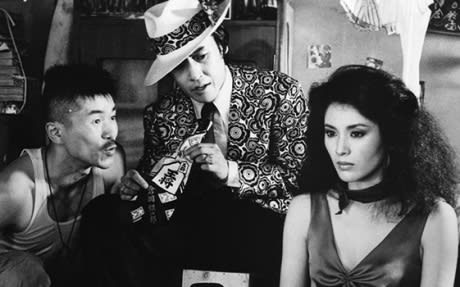Best known for the quirky, ultra-violent hipster hallmark, Battle Royale (it's often the only Japanese film pop culture gluttons have seen), out of a long list of credits that primarily dealt in action and adventure, Kinji Fukasaku tried his hand at romantic dramedy with 1982's Fall Guy to mixed results.
Taking place during the shooting of a samurai film, this relatively simple story explores the lure of celebrity, and more specifically, the lengths people of submissive character will go to please a magnetic personality.
It starts out as a sendup of star culture, with two egomaniacs – one a fading film actor, the other a rising television talent – jockeying for screen time. Each has an entourage of toadies to fluff his peacock feathers, making the whole scene more than a little tedious and difficult for the director to manage.
Ginshiro (Morio Kazama), the insecure film star whose fame is steadily eroding due to his childish outbursts and desperate overacting, takes his posse out on the town to celebrate in the tradition of full-blown '80s excess after an attractive young woman recognizes him and asks for his autograph. When he doesn't get any more attention for the rest of the night, he flies into an embarrassing drunken rage that his loyal lackeys can barely contain.
The next day, a depressed and violent Ginshiro brings his washed-up actress girlfriend, Konatsu (Keiko Matsuzaka) to visit his number one lapdog, Yasu (Mitsuru Hirata). He demands that Yasu marry Konatsu because she's pregnant with his child and he's afraid that if anyone found out, the resulting scandal would further damage his faltering career. Ever eager to please, Yasu agrees, even after Ginshiro makes him watch while he forces himself on the distraught, but yielding, woman.
Like a good whipping boy, Yasu takes emotional abuse from Konatsu, caring for her when she falls sick while taking physical abuse at work, leaping at any opportunity to make extra cash by volunteering for dangerous stunt work that trained professionals balk at. And he does so with a smile on his face, gleefully exclaiming "my girl is pregnant!" after every body-mangling tumble.
Real love begins to sprout between the two but both still bow and scrape to Ginshiro's every beck and tantrum whenever he's lonely and bored enough to grace them with his manipulative presence.
Filled with frantic energy and slapstick humour for the first half of the film, Fall Guy becomes more sombre as it goes on, making for an uneven viewing experience. Although, the turn towards drama towards the end provides a stage for more mature character development than would be expected, given the glib satire that starts off the picture.
Overall, it all feels as forced and staged as Yasu and Konatsu's relationship, but that's part of the point. Every relationship is, to a lesser or greater degree, a performance.
It's kind of a heavy sentiment for a movie that features a song that sounds like a klezmer version of the Gremlins theme.
Fall Guy screens at the TIFF Bell Lightbox as part of the Japanese Cinema of the Eighties retrospective at 7pm on March 17th, 2013.
(Shochiku Eiga)Taking place during the shooting of a samurai film, this relatively simple story explores the lure of celebrity, and more specifically, the lengths people of submissive character will go to please a magnetic personality.
It starts out as a sendup of star culture, with two egomaniacs – one a fading film actor, the other a rising television talent – jockeying for screen time. Each has an entourage of toadies to fluff his peacock feathers, making the whole scene more than a little tedious and difficult for the director to manage.
Ginshiro (Morio Kazama), the insecure film star whose fame is steadily eroding due to his childish outbursts and desperate overacting, takes his posse out on the town to celebrate in the tradition of full-blown '80s excess after an attractive young woman recognizes him and asks for his autograph. When he doesn't get any more attention for the rest of the night, he flies into an embarrassing drunken rage that his loyal lackeys can barely contain.
The next day, a depressed and violent Ginshiro brings his washed-up actress girlfriend, Konatsu (Keiko Matsuzaka) to visit his number one lapdog, Yasu (Mitsuru Hirata). He demands that Yasu marry Konatsu because she's pregnant with his child and he's afraid that if anyone found out, the resulting scandal would further damage his faltering career. Ever eager to please, Yasu agrees, even after Ginshiro makes him watch while he forces himself on the distraught, but yielding, woman.
Like a good whipping boy, Yasu takes emotional abuse from Konatsu, caring for her when she falls sick while taking physical abuse at work, leaping at any opportunity to make extra cash by volunteering for dangerous stunt work that trained professionals balk at. And he does so with a smile on his face, gleefully exclaiming "my girl is pregnant!" after every body-mangling tumble.
Real love begins to sprout between the two but both still bow and scrape to Ginshiro's every beck and tantrum whenever he's lonely and bored enough to grace them with his manipulative presence.
Filled with frantic energy and slapstick humour for the first half of the film, Fall Guy becomes more sombre as it goes on, making for an uneven viewing experience. Although, the turn towards drama towards the end provides a stage for more mature character development than would be expected, given the glib satire that starts off the picture.
Overall, it all feels as forced and staged as Yasu and Konatsu's relationship, but that's part of the point. Every relationship is, to a lesser or greater degree, a performance.
It's kind of a heavy sentiment for a movie that features a song that sounds like a klezmer version of the Gremlins theme.
Fall Guy screens at the TIFF Bell Lightbox as part of the Japanese Cinema of the Eighties retrospective at 7pm on March 17th, 2013.
